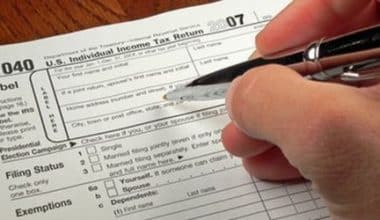The transfer of assets from an estate is subject to the Maryland estate tax. The tax depends in accordance with Internal Revenue Code section 2011 and is on the maximum credit for state death taxes that the federal estate tax may apply. This article talks about how to calculate the Maryland income tax rates for nonresident. It also talks about the Maryland income tax refund and the comptroller of Maryland.
Maryland Income Tax Rates
Income tax rates in Maryland are progressive and run from 2.00% to 5.75%. This maximum rate is lower than the national average. Additional income taxes are collected by all counties in Maryland and by the city of Baltimore. With eight distinct tax levels, Maryland’s state income tax rates are among the most progressive in the country. The municipal income tax rates in Baltimore and the other counties in Maryland are in addition to the state income tax.
There is no need to file a separate income tax return for the county or city because you can include the appropriate information on your Maryland state income tax return. Prices in the area are between 2.25 and 3.20 percent. In Maryland, your local income tax rates are determined by where you really live, and not where you happen to be employed. You could or might not have to pay Maryland state income tax if you’re not a resident but get income from the state. Your eligibility will depend by the nature of your Maryland-earned income and by whether or not your home state has a reciprocal agreement with Maryland. Your employer will deduct income tax from your paychecks at the nonresident rate of 2.25 percent if you have Maryland-taxable earnings.
Maryland Income Tax Refund
Online Maryland income tax refund status checks are also available, as well as automated refund status checks at (410) 260-7701 or 1-800-218-8160. Make sure you have a copy of your return on hand so you can double-check the data. You can also send an email to taxhelp@marylandtaxes.gov to inquire about your refund. Don’t forget to mention in your email request your name, social security number, and the amount of the refund.
Instead of utilizing a paper return, file electronically if you anticipate receiving a tax refund and need it immediately. If you select direct deposit, we will deposit your refund into your bank account a few days after we receive and process your return.
#1. Digital Filers
We typically begin processing tax returns that have been filed electronically the day after they are delivered to us. Check our online system if you filed your taxes electronically through a pro and haven’t received your refund yet. If your preparer isn’t there, call them to confirm that your return was sent to us and on what day. Call our refund line if enough time has passed since that date.
#2. Document Filer
The processing time for paper returns is 30 days. Keep in mind that once your return has been processed and appears in our computer system, you will receive an acknowledgment of its receipt. A refund typically takes longer when the returned item contains:
- math mistakes
- missing data in the mandatory parts.
- a purported payment of estimated taxes that does not match the amount we have on file.
#3. Check Cashing Services
Remind the check cashing vendor that we cannot verify any information about your return over the phone if you intend to use a check cashing service to cash your refund check. We are required to maintain the privacy of your tax information because it is sensitive.
Those Who Qualify for Maryland Income Tax Refund
Any resident of Maryland who has paid taxes on earnings made in another state, a locality of another state, or the District of Columbia may be qualified for a refund. This mostly relates to business owners or partners who earn “pass-through” revenue from companies based in foreign jurisdictions, but it also applies to other sorts of income.
How Can I Find Out if I’m Eligible for Maryland Income Tax Refund and What Actions Do I Need to Take?
The office of Comptroller Peter Franchot is dedicated to providing our citizens with the information they require and giving refunds as soon as feasible to those who qualify. Visit here for the most recent information from the Comptroller’s office to get started.
Your individual situation will determine how complicated this is. You might want to consult a tax expert for advice on the “Wynne” ruling.
Maryland Income Tax for Nonresident
In addition to the standard income tax rate in effect for residents, a special income tax rate of 2.25 percent applies to Maryland nonresident(s). Either resident or nonresident with Maryland-sourced income must file and pay state tax or taxes. In this state, the income tax rate can be anywhere from 2% to 5.75%, and the sales tax rate is 6%.
Standard and itemized deductions, as well as the earned income tax credit, the child and dependent care credit, and the college savings tax deduction are all available in Maryland.
We’ll have eleven divisions in 2022: 2.25, 2.40, 2.45, 2.65, 2.81, 2.96, 3.00, 3.03, 3.05, 3.06, 3.10, and 3.20 percent. Use the table that corresponds to the county listed below without going over the real local tax rate. While calculating withholding amounts, employers will use $3,200 as the value of an exemption. However, employees should “phase out” or minimize the number of exemptions, so there is no need to account for any decrease in the exemption amount.
Comptroller of Maryland
The people of Maryland elect the Comptroller of the State of Maryland (pronounced “kämp-‘tr-lr”) to a four-year term as the state’s chief financial officer. The tenure of the comptroller is indefinite. Due to worries about the possibility of fraud and corruption in the management of the public treasury, the office was created by the Second Maryland Constitution in 1851.
Tax collection is the Comptroller of Maryland’s main responsibility. The organization has a budget of $110 million, collects around $16 billion in state and local taxes annually, and offers services through 12 branch offices across the state. Sales and use taxes, together with personal and business income taxes, are the main revenue generators. The organization also collects taxes on alcohol, cigarettes, estates, admissions, and amusements. Meanwhile, the Maryland comptroller is responsible for overseeing the regulation of alcohol, tobacco, and motor fuel products. By conducting quality checks on motor fuel, aggressively going after cigarette smugglers, and protecting our state’s youth from harmful caffeinated alcoholic beverages, the Maryland comptroller defends consumers and small businesses.
The Maryland comptroller creates a level playing field for local firms competing with out-of-state shops that don’t pay their fair share by enforcing the collection of taxes. Additionally, the Comptroller’s Office conducts audits of taxpayers to ensure compliance, manages the recovery of back taxes, and upholds license and unclaimed property regulations. The organization advertises missing bank accounts, and insurance benefits, and helps taxpayers find their misplaced belongings.
Most state agencies depend on the office’s information technology capabilities to run their everyday operations. The Maryland comptroller serves as the state’s primary accountant, paying bills, keeping books, creating financial reports, and paying staff.
| Website | http://www.marylandtaxes.gov |
| Industries | Government administration |
| Size of the company | 5000 employees |
| Headquarters location | Annapolis, Maryland |
| Type | Government agency |
| Established | Established in 1851 |
Do I Have to Pay Income Tax in Maryland?
If you are a resident of Maryland, whether full- or part-time, you are eligible to file a Maryland tax return. Additionally, if you are bound to file a federal income tax return, you are also bound to file a Maryland tax return. If you are not a resident of Maryland yet had income from a source within the state, you are required to submit a tax return as a nonresident (form 505 or 515).
You should also be aware that your county may require you to pay a local income tax.
Does Maryland Have High-Income Tax?
Individuals in Maryland are subject to a progressive tax structure, with rates ranging from 2.0 percent all the way up to 5.75 percent. Additionally, there are jurisdictions that are responsible for the collection of municipal income taxes. The rate at which corporations in Maryland must pay income tax is 8.25 percent. The state of Maryland imposes a sales tax of 6% on all purchases, but there are no additional local sales taxes.
Who Is Exempt From Maryland Income Tax?
Depending on which filing status you choose for your federal income tax return, you can choose from one of six different filing statuses in Maryland. Taxpayers filing as Single Dependents who have a gross income of $12,550. Or maybe more are obliged to submit a Maryland income tax return. This requirement applies regardless of whether the taxpayer earned or received their income.
What 3 States Have the Highest Income Tax?
You can get more out of your money by taking into account how the tax system works in conjunction with your whole financial picture. The following is a compilation of the states with the highest and lowest tax rates. For the year 2021, the states of California (at 13.3%), Hawaii (at 11%), New Jersey (10.75%), Oregon (9.9%), and Minnesota (at 9.85%) will have the highest individual income tax rates.
Does Maryland Get Lots of Snow?
The typical annual accumulation of snow is 20.6 inches. The lower Eastern Shore receives an average of 10 inches, whereas Garrett County receives an average of 110 inches. In Maryland, the record for the greatest snowfall in a single winter was set during the winter of 2009-2010, when Keysers Ridge in Garrett County received a total of 262.5 inches of snowfall throughout the course of the season.
Is Maryland a High-Tax State?
Although the Maryland tax system is fairly benevolent to consumers
What Is Maryland’s Income Tax Rate for 2022?
Your taxable income is used to determine the local income tax rate. The rates, which for the current tax year vary between 2.25% and 3.20%, were determined by local officials.
Is Maryland’s Income Tax Higher Than Virginia?
At all of the income levels that we compared, Maryland’s income taxes are not lower than Virginia’s due to the additional municipal income tax rates in the state.
Is MD a Tax-Friendly State?
Maryland has a low level of tax relief for retirees. Income from Social Security is tax-free. Retirement account withdrawals are subject to a portion of taxes.
What Is the Most Tax-Friendly State?
Wyoming is the state with the lowest taxes for middle-class families in Wyoming. First off, Wyoming has no income tax.
What States Are the Worst for Taxes?
The top 10 taxing states (or legal jurisdictions) for personal income in 2021 are:
- New Jersey 10.75%
- Oregon 9.9%
- Minnesota 9.85%
- District of Columbia 8.95%
- New York 8.82%
- Vermont 8.75%
- Iowa 8.53%
Conclusion
The taxes paid in Maryland have led to its development, thereby making the economy grow. Even nonresidents pay taxes in Maryland. That means, even though you are a resident or not, so long as you are within or you earn in the sources of the Maryland axis, you will pay tax. They progress and develop through their taxes, and they also have more additional taxes.
If there was no federal estate tax in place at the time of the decedent’s death, the Maryland estate tax will be calculated using the maximum credit for state death taxes that would have been available without reduction on the day before the federal estate tax was repealed. This article teaches about the “Maryland income tax.”
Maryland Income Tax FAQs
How is Maryland income tax calculated?
Maryland’s personal tax rates for the tax year 2021 begin at 2% on the first $1000 of taxable income. It then rises to a maximum of 5.75% on incomes above $250,000 (or $300,000 for taxpayers filing jointly, heads of family, or qualified widows).
Who must pay Maryland income tax?
If you are a Maryland resident, you must file a Maryland income tax return if you are required to file a federal income tax return and your gross income equals or exceeds the level specified for your filing status in the Filing Requirements section above and in Instruction 1 of the Maryland resident tax booklet.
What income is not taxable in Maryland?
Retirees earning up to $50,000 in Maryland will pay no state tax. This tax cut will be implemented in over five years, starting in fiscal year 22.
Related Articles
- MARYLAND SMALL BUSINESS GRANT:19+Reliable Grants for any Business
- Financial Controller: Functions, Skills, Salary, Qualifications (detailed guide)
- WRITERS GRANTS: Top 50 For Poets, Fiction & Nonfiction Writers In 2022 (UPDATED!)
- How do Money Orders Work? (+How to Buy with Debit Cards)
- INCOME TAX: Overview, e Filing and Calculator
- INHERITANCE TAX: Overview & Threshold Explained
- How to Cash a Cashier’s Check: All you should know






